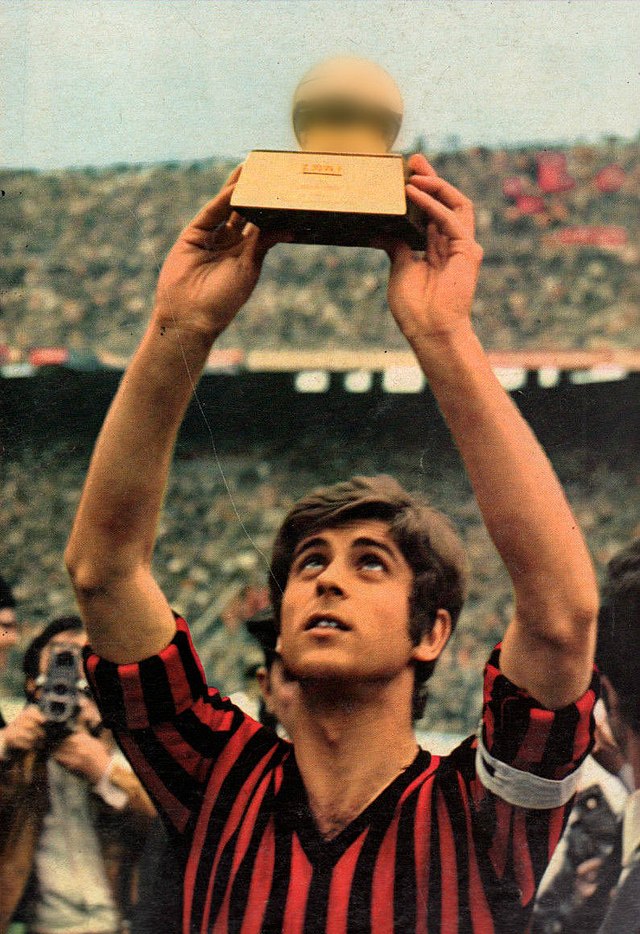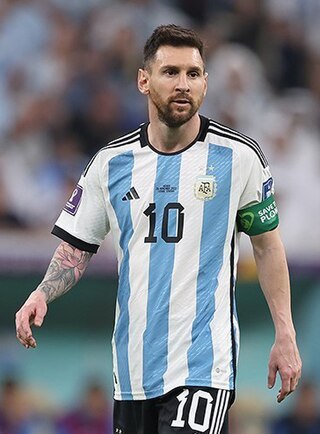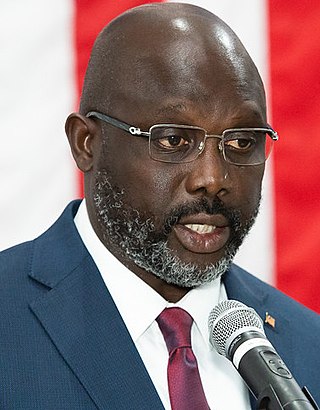Top Qs
Timeline
Chat
Perspective
Ballon d'Or
Annual association football award From Wikipedia, the free encyclopedia
Remove ads
The Ballon d'Or (French pronunciation: [balɔ̃ dɔʁ] ⓘ; lit. 'Golden Ball') is an annual football award presented by French magazine France Football since 1956 to honour the player deemed to have performed the best over the previous season.
Conceived by sports writers Gabriel Hanot and Jacques Ferran, the Ballon d'Or was based exclusively on voting by football journalists up until 2006. Originally, it was awarded only to players from Europe and was widely known as the European Footballer of the Year award. In 1995, the Ballon d'Or was expanded to include all players of any origin that have been active at European clubs. The award became a global prize in 2007 with all professional footballers from around the world being eligible; additionally, coaches and captains of national teams were also given the right to vote, before reverting to just journalists in 2016.
Between 2010 and 2015, in an agreement with FIFA, the award was merged with the FIFA World Player of the Year, and was known as the FIFA Ballon d'Or. That partnership ended in 2016, and the award reverted to the Ballon d'Or, while FIFA also reverted to its own separate annual award, The Best FIFA Men's Player. In 2022, France Football modified the rules for the Ballon d'Or. The timing was changed so that awards were given not for achievements during a calendar year, but for a football season, and it was also determined that an international jury of specialized journalists, with one representative per country, from the top 100 in the latest FIFA Men's World Ranking would elect the winner of the award. UEFA co-organizes the Ballon d'Or gala since 2024, with France Football retaining the voting system and the Ballon d'Or name.
Lionel Messi has won the Ballon d'Or a record eight times, followed by Cristiano Ronaldo with five. Johan Cruyff, Michel Platini and Marco van Basten each won the award three times, while Alfredo Di Stéfano, Franz Beckenbauer, Kevin Keegan, Karl-Heinz Rummenigge and Ronaldo have each won it twice. Ousmane Dembélé is the current holder of the award, having won its most recent edition in 2025.
Remove ads
Overview
Summarize
Perspective

The Ballon d'Or is widely regarded as football's most prestigious and valuable individual award.[1][2][3][4] Prior to 2007, it was based exclusively on voting by football journalists and was generally known as the continental European Footballer of the Year award in English language and much international media.[5][6] Even after 2007, it was usually identified with and referred to by that name because of its origin as a European award,[7][8] until it was merged with the FIFA World Player of the Year award cementing its new worldwide claim.[9][10] Stanley Matthews of England was the inaugural winner of the award.[11][12] Liberia's George Weah, the only African recipient, became the first non-European to win the award in 1995, the year that rules of eligibility were changed and the Ballon d'Or was expanded to include all players of any origin, active at European clubs;[13][14] two years later, Ronaldo of Brazil became the first South American without a European citizenship to claim the award,[13] and he is still the youngest winner ever at 21 years, 96 days old.[15] The award became a global prize in 2007 with all professional footballers from clubs around the world being eligible;[16] additionally, coaches and captains of national teams were also given the right to vote,[6][15] before reverting to just journalists in 2016.[17][18]
Lionel Messi holds the record for most Ballon d'Or wins with eight,[4][19] while five-time winner Cristiano Ronaldo earned the most nominations with eighteen.[20] Messi is the only player to win the award with three clubs and also the only one to win it while playing outside Europe,[21][22] as well as being the player with the most podiums, finishing in the top-three a record fourteen times, including eleven consecutive from 2007 to 2017.[4] Three players have won the award three times each: Johan Cruyff, Michel Platini and Marco van Basten.[11][20] With seven awards each, Dutch, German, and Portuguese players have won the second most Ballons d'Or, underneath Argentina and France in first with eight.[14] Players from West Germany (1972, 1981) and the Netherlands (1988) occupied the top-three spots in a single year. West German (1972) and Italian (1988–1990) clubs achieved the same feat, including two individual years dominated by Milan players (1988, 1989), a unique record until Spanish clubs experienced an unprecedented dominance (2009–2012, 2015, 2016) and Barcelona (2010) became the second club to occupy the top-three.[19] The award shows a bias in favour of attacking players,[23] and, over time, it has gone to a more exclusive set of leagues and clubs.[6] Prior to 1995, ten leagues supplied Ballon d'Or winners, whereas only England, France, Germany, Italy, Spain and the United States have supplied winners since then.[6][24] Spain's La Liga has the most Ballon d'Or winners overall, with twenty-four wins shared between Barcelona and Real Madrid; with twelve wins each,[25] the two Spanish clubs also lead the overall club ranking for producing the most winners.[24][26]
Between 2010 and 2015 inclusive, the award was merged with a similar one, the FIFA World Player of the Year award, to create the FIFA Ballon d'Or,[18][27] which was awarded to the world's best male player before FIFA and France Football decided not to continue the merging agreement.[2][15] The recipients of the joint FIFA Ballon d'Or are considered as winners by both award organizations.[6][28][29] After 2011, UEFA created the UEFA Best Player in Europe Award to maintain the tradition of the original Ballon d'Or of specifically honouring a football player from Europe.[30] In 2020, Groupe Amaury, to which France Football belongs,[31] decided that no award would be given for the year due to the impact of the COVID-19 pandemic on association football.[1][32] The widespread public opinion is that the 2020 Ballon d'Or should have been awarded to Robert Lewandowski.[33][34][35]
France Football modified the rules for the Ballon d'Or in 2022.[18] They changed the timing so that awards were given not for achievements during a calendar year, but for a football season.[15][36] It was also decided that an international jury of specialized journalists, with one representative per country, from the top 100 in the latest FIFA Men's World Ranking would determine the winner of the award;[17][37] the plebiscite had previously been open to all countries since 2007.[15][36] UEFA co-organizes the Ballon d'Or gala since 2024, with France Football retaining the voting system and the Ballon d'Or name.[31][38]
Criteria
The Ballon d'Or is awarded based on three main criteria:[18][37]
- 1) Individual performances, decisive and impressive character;
- 2) Team performances and achievements;
- 3) Class and fair play.
Nevertheless, critics have occasionally described the award as a "popularity contest",[39][40] criticizing its voting process,[17] its bias in favour of attacking players,[23] and the idea of systematically singling out an individual in a team sport.[41][42]
Remove ads
Winners
Summarize
Perspective










Note: Until 2021, the Ballon d'Or was awarded based on player performance during the calendar year. Since 2022, jurors have been instructed to take into account the previous season.[2][36]
| Player (X) | Denotes the number of times the player had won the award at that time (for players with multiple wins) |
- Notes
- Born in Argentina, Di Stéfano acquired Spanish citizenship in 1956, thus becoming eligible for the award.
- Kopa was signed by Reims from Real Madrid during 1959.
- Born in Argentina, Sívori acquired Italian citizenship in 1961, thus becoming eligible for the award.
- Krankl was signed by Barcelona from Rapid Wien during 1978.
- Schuster was signed by Barcelona from 1. FC Köln during 1980.
- Boniek was signed by Juventus from Widzew Łódź during 1982.
- Simonsen was signed by Vejle from Charlton Athletic during 1983.
- Gullit was signed by AC Milan from PSV Eindhoven during 1987.
- Weah was signed by AC Milan from Paris Saint-Germain during 1995.
- Klinsmann was signed by Bayern Munich from Tottenham Hotspur during 1995.
- Ronaldo was signed by Barcelona from PSV Eindhoven during 1996.
- Shearer was signed by Newcastle United from Blackburn Rovers during 1996.
- Shevchenko was signed by AC Milan from Dynamo Kyiv during 1999.
- Ronaldo was signed by Real Madrid from Inter Milan during 2002.
- Cristiano Ronaldo was signed by Real Madrid from Manchester United during 2009.
- Cristiano Ronaldo was signed by Juventus from Real Madrid during 2018.
- Messi was signed by Inter Miami from Paris Saint-Germain during 2023.
Wins by player



Wins by country

Wins by club


Remove ads
Additional awards
Summarize
Perspective
Seasonal awards
Emiliano Martínez—two times winner of the Yashin Trophy—and Robert Lewandowski—two times winner of the Gerd Müller Trophy.
- First awarded in 2018, the Ballon d'Or Féminin honours the female player deemed to have performed the best over the previous season.[20][45]
- Since 2018 France Football has given out the Kopa Trophy to the best performing player under the age of 21. The award is named after 1958 Ballon d'Or winner Raymond Kopa.[46]
- First awarded in 2019, the Yashin Trophy is presented to the best goalkeeper of the season. The award is named after Soviet goalkeeper and 1963 Ballon d'Or winner Lev Yashin.[47]
- In 2021, France Football gave Robert Lewandowski the Striker of the Year award for scoring the most goals the previous season.[48] Following Gerd Müller's death in 2021, the award was renamed for the 2022 edition to the Gerd Müller Trophy.[49]
- Starting from 2022, France Football has given out the Sócrates Award, which acknowledges footballers for their humanitarian work.[50] The award is named after late Brazilian footballer Sócrates, who co-founded the Corinthians Democracy movement, in opposition to the ruling military dictatorship in Brazil during the 1980s.[51]
- France Football first gave out the Men's Club of the Year award in 2021, with the inaugural winner being Chelsea.[52][53] Manchester City won back-to-back in 2022 and 2023,[54] while Real Madrid won the most recent edition in 2024.[55] The Women's Club of the Year was awarded in 2023 and 2024, and FC Barcelona Femení won it in both occasions.[56]
- France Football first presented the Johan Cruyff Trophy for best coach in 2024.[31][38] The inaugural winner of the Men's Coach of the Year was Carlo Ancelotti of Real Madrid, while the Women's Coach of the Year was awarded to Emma Hayes, who managed both Chelsea and the United States national team.[57]
Special awards


Super Ballon d'Or

An honorary award, under the name Super Ballon d'Or, was awarded to Alfredo Di Stéfano in 1989,[17] who was voted the best multiple-time Ballon d'Or winner ahead of Johan Cruyff and Michel Platini.[58][59]
In addition Diego Maradona received an honorary Ballon d'Or in 1995 for his services to football dubbed the Golden Ballon d'Or.[17][58][60] Pelé also received a similar award during the 2013 FIFA Ballon d'Or ceremony dubbed the FIFA Ballon d'Or Prix d'Honneur.[17][61]
Football Player of the Century
In 1999, France Football voted Pelé as the Football Player of the Century after consulting their former Ballon d'Or recipients.[17] Among the 34 previous winners, 30 cast their votes, while Stanley Matthews, Omar Sívori and George Best refused to vote, and Lev Yashin had died. Each voter was allotted five votes worth up to five points; however, Di Stéfano only chose a first place, Platini a first and second place, and George Weah two players for fifth place. Pelé was named the greatest by 17 voters, receiving almost double the number of points earned by the second place, Diego Maradona.[62]
Le nouveau palmarès
To coincide with the 60th anniversary of the Ballon d'Or in 2016, France Football published an internationalized reevaluation of the awards presented before 1995, when only European players were eligible to win the award.[17][60] 12 out of the 39 Ballons d'Or presented during this time period would have been awarded to South American players; in addition to Pelé—seven times—and Diego Maradona—twice—Garrincha, Mario Kempes, and Romário were retrospectively recognized as worthy winners.[60][63] The original recipients, however, remain unchanged.[3]
Ballon d'Or Dream Team

An all-time all-star team, the Ballon d'Or Dream Team, was published in December 2020 by France Football, honouring football's greatest players of all time.[64][65] A second and a third team were also published.[66]
Remove ads
References
Wikiwand - on
Seamless Wikipedia browsing. On steroids.
Remove ads



